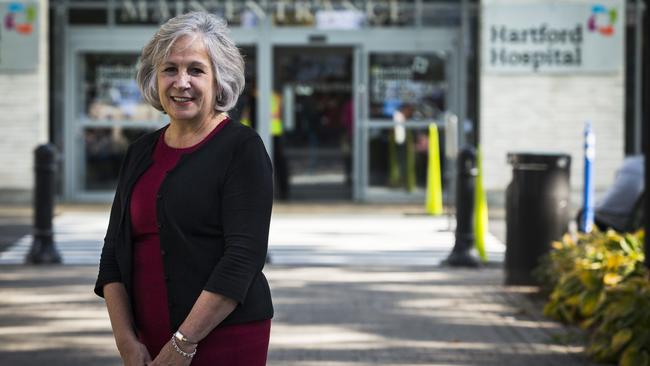Army Nurse Led the Way in Iraq

http://www.courant.com/hometown-heroes/hc-hh-maria-tackett-hometown-hero-1113-2-20161112-story.html
Before Army reservist Maria Tackett could deploy to Iraq in 2007 to tend to injured U.S. Marines, she had a final hurdle to clear: displaying proficiency with her M-16 rifle.
Tackett's medical knowledge and skills were beyond question. A veteran nurse with multiple degrees, she was nursing director of Hartford Hospital's Neuro-Trauma Unit and Emergency Department. She had joined the U.S. Army Reserve in 1990 and risen to the rank of lieutenant colonel. She was slated to be the head emergency room nurse for the 325th Combat Support Hospital at Al Asad Air Base — in the volatile "Sunni Triangle" northwest of Baghdad.
But before she could become third in command of the hospital's 100-member cohort, she needed to master her M-16. Tackett, a Hartford native who is slight and barely 5 feet tall, was 57 at the time. Day after day, she donned cumbersome infantry gear, went to the rifle range and started shooting. It took her 17 days to pass.
Tackett never fired a shot thereafter, but her cheerful perseverance was not lost on her fellow trainees, the vast majority of whom were male and decades younger.
"She never complained," said Yancy Caruthers, who served under Tackett. "She'd come back at the end of each day with dirt all over her face and she'd be smiling right through it."
Serving in Iraq would make firing an M-16 seem like a piece of cake. For nine months she ran the hospital's emergency room, dealing largely with blast wounds caused by IEDs, which were horrific and extremely rare in civilian practice. It was a brave new world.
She could have gone home for two weeks to see her family, including her grown daughter, or taken a long weekend in Qatar, but she soldiered straight through her tour of duty — 12 hours a day, six days a week, sometimes seven.
Her presence, both as an administrator and hands-on nurse, made a difference. John Bourges was one of the nurses who served under Tackett.
"She's a great leader with a natural calmness about her and an ability to instill confidence and cohesiveness in our unit," he said. The retired New York City homicide detective decided to become an Army nurse after 9/11. Bourges and Tackett have stayed in touch.
Caruthers, who wrote a book about his experiences in Iraq, agrees with Bourges' view of Tackett: "Her presence in the room changed everything."
Among the more mundane challenges Tackett and company faced were temperatures that spiked above 115 degrees, sandstorms and a mile walk from the hospital to the mess hall. Only the Marines set foot outside the base.
So why does a middle-aged woman with an important job join the Army Reserves and put her life on hold for a year to court death and devastation far from home?
"It had to do with my skill set and people telling me this is a skill set that was needed in the Army," Tackett explained. "The other piece of it was that my parents were Greek immigrants; I grew up in the south end of Hartford, on a block where six languages other than English were spoken. I grew up in a household where every day I was reminded how fortunate we were to be living in this country, to have an education, to have such opportunities."
Tackett retired from the Army reserves in 2010 after 20 years of service. In addition to her work at Hartford Hospital as nursing director for Education and Research, she teaches at the UConn School of Nursing. Her daughter, Christina, is an Army reservist, serving as a JAG lawyer.
Tackett's contributions are still being felt, according to Caruthers: "Many of the people who worked with Maria over there went on to do bigger and better things; they became leaders themselves. They are emulating what they saw in Maria."